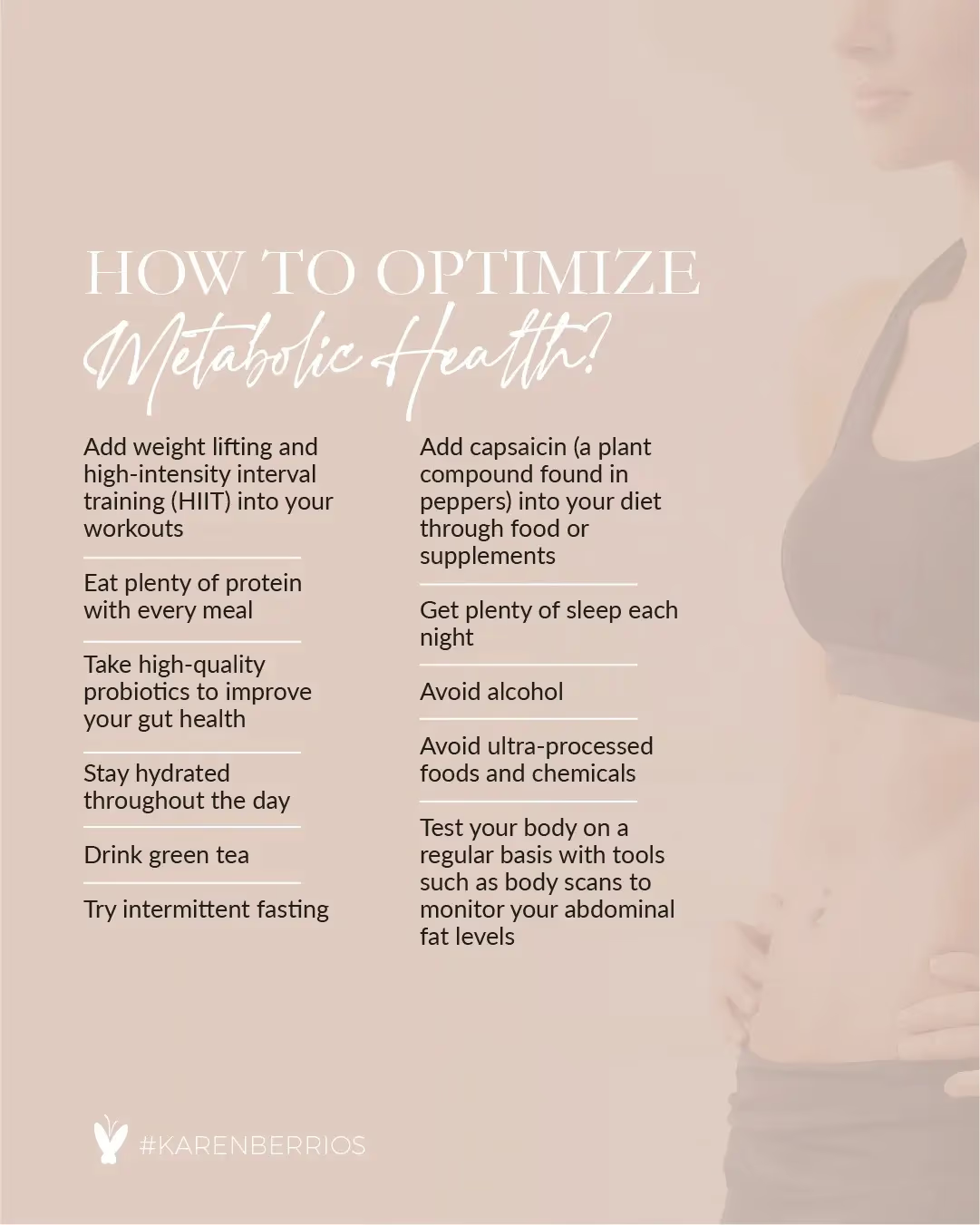

Metabolic health – Is Cancer a Metabolic Disease?
Metabolic health is the cornerstone of overall well-being, influencing everything from energy levels to disease prevention. A growing body of research suggests that maintaining optimal metabolic function is crucial in combating chronic diseases, including cancer. I recently attended
The 33rd Annual Spring Congress with A4M which was a transformative experience as it aimed to provide evidence through case studies, in connection to metabolic health, disease and prevention. Hosted by The American Academy of Anti-Aging Medicine (A4M), this event highlighted the cutting-edge healthcare technologies and strategies that combat chronic diseases associated with aging. The Metabolic Medical Institute (MMI), A4M’s educational arm, offered advanced training and continuing medical education. Engaging with leading experts and learning about the latest research in metabolic medicine reaffirmed my belief in a holistic approach to health, especially in understanding cancer as a metabolic disease. This event has inspired me to delve deeper into this paradigm shift in cancer treatment and prevention.
Cancer is one of the leading causes of death worldwide, and new cases are being diagnosed and discovered on a daily basis. While there’s so much we still don’t know about this deadly disease, researchers around the world are doing their best to find better ways to improve early detection, new treatments and procedures, as well as preventative measures that can help more people avoid getting a diagnosis in the first place.
Even though it was previously thought that cancer was purely a genetic disease, the latest research points out its more complex origins. It involves genetic changes, that’s certain, but it also shows modifications in epigenetics as well as in metabolic health. With plenty of studies underway, it’s safe to say that cancer cells are deeply intertwined in a complex network between genetics, epigenetics, and metabolic health. Which area has more influence than others will depend on a variety of factors, and differ from person to person.
What is Metabolic Health?
Before we dive into the connection between cancer and metabolic health, it’s crucial to define this term and explain the processes involved in it. Metabolic health is defined by the way your body manages energy production, its utilization, and storage. If your body is performing all of these actions in an optimal way, you are considered to have good metabolic health. On the other hand, if you’re dealing with certain dysfunctions in this area, you’re considered to have poor metabolic health.
Many people with poor metabolic health have increased levels of inflammation in the body, extra weight, potential metabolic diseases like diabetes type II, non-alcoholic fatty liver disease, and obesity, as well as an increased risk of cancer.
Although some may consider the Body Mass Index (BMI) to be the best indicator of metabolic health, it hasn’t always proven to be the case. However, other markers of metabolic health include:
- Blood glucose levels – fasting glucose levels that are within healthy margins, as well as levels of hemoglobin (HbA1c), showcase your glucose metabolism as well as insulin sensitivity.
- Cholesterol and triglyceride levels – LDL cholesterol levels that are in a healthy range as well as low triglycerides, showcase good lipid metabolism and good cardiovascular health.
- Blood pressure – blood pressure that’s within normal numbers indicate good cardiovascular health and proper fluid balance. Even though the coveted 120/80 golden rule is what many people are aiming for, it’s not the case for everyone. Some people might genetically have lower blood pressure than others, which indicates their healthy numbers.
- Insulin Sensitivity – closely connected to your fasting glucose and hemoglobin levels, insulin sensitivity is a great indicator of metabolic health. Any type of metabolic dysfunction could lead to insulin resistance and, with it, prediabetes and diabetes.
- Waist circumference – Even though BMI measures your body-to-weight ratio, it’s not always accurate. People have differently shaped bodies with heavier and lighter frames, which can sometimes skew the data. Therefore, measuring your waist circumference is a better indicator of metabolic health. When you’re measuring your waist, you’re basically measuring abdominal fat, which is the fat you accumulate around your organs. It’s the most dangerous type of fat in your body, which is why it’s crucial for metabolic health. Sometimes, doctors might even point you to perform a body scan, which can give you a better picture of what your abdominal muscle/fat ratio looks like.
- Hormone balance – getting a hormone panel done can help showcase the state of your hormones and with it, shine a light on any imbalances.
- Inflammatory markers – Certain inflammatory markers like C-reactive protein (CRP) can indicate good and poor metabolic health.
Metabolic Diseases
When metabolic functions are not performed in their optimal way, this can lead to a variety of chronic illnesses as well as cancer. Here are some of the most common metabolic diseases:
- Metabolic Syndrome – not a disease per se, metabolic syndrome represents a combination of different risk factors which, together, might cause a variety of cardiovascular issues.
- Diabetes Type II – a metabolic disease caused by insulin resistance.
- Obesity – Increased inflammation and dysfunction in key indicators of metabolic health when there’s a significant amount of extra weight present in the human body.
- Non-alcoholic Fatty Liver Disease – a condition that occurs when fat starts accumulating in the liver.
Additionally, some metabolic diseases can also be inherited.
Metabolic Disorders and Cancer
Most of these metabolic disorders revolve around the key indicators that showcase a snapshot of your actual metabolic health. From glucose intolerance and insulin resistance to fat build-up in different areas of your body, these dysfunctions can wreak havoc and cause certain cells to start acting abnormally.
Cancer is defined as a disease that is represented by cells acting in an abnormal way, whether through rapid growth or spreading to other tissues where they normally wouldn’t. Research suggests that the metabolic profile of cancer cells shows an increase in glucose and glutamine, as well as other factors like increased glycolysis, modifications in the use of metabolic enzyme isoforms, and even increased secretion of lactate (NIH). Additional research shows a connection between obesity and breast cancer in post-menopausal women, as well as many other forms of cancer such as colon cancer, pancreatic cancer, liver cancer, bladder cancer, and more. The role of metabolic health has never been more important in cancer prevention, and ongoing research is only proving its significance.
Cancer metabolism is defined as its ability to extract nutrients needed to thrive from its surrounding areas, and therefore increase its mass. This field is still under plenty of research, but the current findings are trying to showcase how this process is performed and whether or not certain areas of metabolic health can have an impact. What’s known as of today is that poor metabolic health is directly linked to cancer metabolism, enabling it to perform its functions in an environment where it usually wouldn’t.
How to Optimize Your Metabolic Health
I had the pleasure to attend the a4m Spring Congress Exibit this year where the focus was on metabolic health and the best ways to optimize it. Other than the obvious ways of optimizing your metabolic health with healthy food, exercise, good sleep patterns, and staying away from ultra-processed products and toxins, there are some more specific ways to improve your metabolic health. Here are some of the research-backed takeaways:
- Performing specific exercises such as high-intensity interval training (HIIT)
- Lifting weights instead of only doing cardio or HIIT
- Eating plenty of protein with every meal
- Taking high-quality probiotics to improve your gut health
- Staying hydrated throughout the day
- Drinking green tea
- Trying intermittent fasting
- Adding capsaicin (a plant compound found in peppers) into your diet through food or supplements
- Testing your body on a regular basis with tools such as body scans to monitor your abdominal fat levels
Final Thoughts
Our metabolic health is directly linked to all of the main functions in our body. It’s crucial to optimize it with all of our daily actions, from what we choose to put on our plate to how much sleep we’re getting per night. It’s time to take care of your body from the inside out and prevent metabolic disorders, including cancer.

hey there
I'm Karen!
I have found my cancer journey to be a positive and profound transformational experience. I’m inspired to share my healing journey here, and trust you’ll find hope, encouragement and purpose as you discover the healing power that lies within you.
Join
The Mailing List!
By signing up for my newsletter, you agree with our Privacy Policy and Terms & Conditions.




